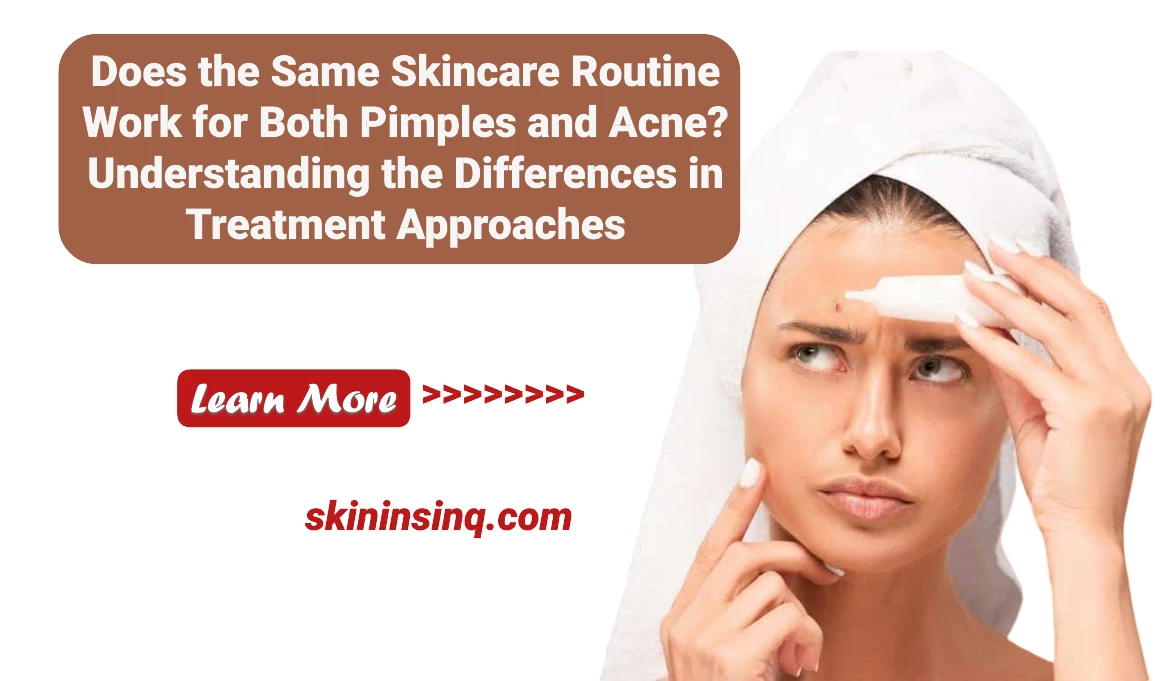Does the Same Skincare Routine Work for Both Pimples and Acne? Understanding the Differences in Treatment Approaches
Does the Same Skincare Routine Work for Both Pimples and Acne? Understanding the Differences in Treatment Approaches
Pimples and acne are often used interchangeably, but they aren't exactly the same. A pimple is typically an isolated breakout caused by clogged pores, while acne is a chronic skin condition characterized by recurring blackheads, whiteheads, pustules, and sometimes cysts. Because of these differences in severity, frequency, and underlying causes, the same skincare routine may not always be equally effective for both. Understanding when to tweak your regimen is essential for clearer, healthier skin.
Key Differences Between Pimples and Acne
-
Pimples are occasional and often triggered by temporary factors like stress, diet changes, or poor hygiene.
-
Acne is more persistent and may be caused by hormonal imbalances, genetics, or underlying skin conditions. It typically requires a more targeted and long-term approach.
While both issues originate from clogged pores and inflammation, acne usually involves a combination of lesions and often recurs in patterns, making it more complex to treat.
Where the Skincare Routine Overlaps
Some foundational skincare steps work well for both pimples and acne:
1. Gentle Cleansing:
Using a mild, non-comedogenic cleanser twice daily helps remove excess oil, dirt, and bacteria that can clog pores.
2. Exfoliation (1–2 times a week):
Light exfoliation with salicylic acid or glycolic acid can help remove dead skin cells and prevent clogged pores. This benefits both occasional pimples and mild acne but should be done cautiously with inflamed or sensitive skin.
3. Spot Treatments:
Both pimples and acne can respond to targeted ingredients like benzoyl peroxide or sulfur-based treatments, which reduce inflammation and kill acne-causing bacteria.
4. Oil-Free Moisturizer:
Hydration is crucial even for oily or breakout-prone skin. A lightweight, non-comedogenic moisturizer helps maintain the skin barrier without causing new breakouts.
5. Daily Sunscreen:
Using a broad-spectrum SPF protects healing pimples or acne scars from darkening due to sun exposure.
Where the Routine Needs to Differ
1. Treatment Strength and Consistency:
Occasional pimples might respond well to short-term spot treatments or adjustments in skincare habits. However, acne usually needs a more consistent regimen with active ingredients like retinoids (e.g., adapalene), salicylic acid, or even prescription treatments like antibiotics or hormonal therapies.
2. Product Potency:
Products designed for mild pimples may not contain strong enough concentrations to treat more persistent acne. For example, 0.5% salicylic acid might help a pimple, but 2% is typically better for acne-prone skin.
3. Professional Guidance:
While occasional pimples can often be managed with over-the-counter products, acne—especially moderate to severe cases—may require the help of a dermatologist for prescription treatments and long-term care strategies.
Conclusion
Although pimples and acne share similarities in how they form, the treatment needs can differ significantly. A basic skincare routine may help manage both, but acne usually demands a more consistent and intensive approach. Tailoring your routine based on the frequency, severity, and triggers of your breakouts will lead to more effective and lasting results.

Related Blog
Can People with Dry Skin Also Have Acne? Understanding Breakouts Beyond Oily Skin Types
Aug 2, 2025 by Admin
General Acne
What Causes Oily Skin and Can It Be Managed Naturally? Exploring Root Causes and Gentle Solutions
Aug 2, 2025 by Admin
General
Does Popping Pimples Always Make Acne Worse? The Risks and Realities of Squeezing Breakouts
Aug 2, 2025 by Admin
General Acne
Do Oily Foods Make Pimples Worse? Uncovering the Truth Behind Diet and Breakouts
Aug 2, 2025 by Admin
General Acne